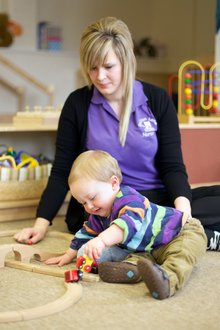Most parents remember their child’s first word, but how many recall when it was spoken – and does it even matter?
Unlike other aspects of your child’s early development, such as feeding and weaning, it can be hard to find accurate information on speech and communication. When you combine that with the often-repeated fact that ‘every child is different’ it is not hard to see why you might not spot a speech problem in your child as early as you could.
“There is an assumption that speaking is something that just happens, and it is often taken for granted”, says Mandy Grist, lead adviser for communications for I CAN, the children’s communication charity. “Parents don’t necessarily chart the stages of a child’s progress in speech in the same way they would their height or weight, for example. Yet, as with everything else, there are milestones in development.”
A recent poll for Save the Children found that more than two thirds (69%) of parents underestimated how many words their child should know by two and a half years, and a quarter do not feel confident that they know what to expect from children’s language at five years.
At what stage, then, should you become concerned that your child is not talking?
Ma-ma, Da-da and beyond
According to speech and language experts, babies start playing with sounds, by putting consonants and vowels together to make ba, da or na, from the age of 6-8 months. By 12 months some will be able to use words such as bye-bye and babble strings of sounds, such as ma-ma or da-da.
By the time your toddler is 18 months old, they should be using simple words, and communicating and responding through other methods, such as pointing. If your child does not appear to be doing these things, they may require support.
Bibiana Twigley, a speech therapist and co-director of Clarity, an organisation which trains and supports teachers and early years professionals in communication, says toddlers should be using words such as mummy, daddy, milk or the pet’s name around this time. “These are functional words which will get them attention, or what they want,” she says.
“Because they might not know much about child development, and won’t have been given any information about speech, we find lot of parents don’t start to get worried that their child isn’t speaking until they’re about two.
“This is particularly true if they live in a community or are part of a group where most toddlers aren’t speaking and there is a perception this is normal.” Ms Twigley adds that in some socially disadvantaged areas between half and 80% of children might have delayed speech.
What to do if you notice a delay?
If you have concerns about your child’s speech, you should consult your health visitor or speak to your child’s key person if they are in an early years setting. Both professionals will be able to advise you on how to have your child assessed and may suggest specific activities or learning targets for your family to work on at home. If there is no improvement after a given time, your child might be referred for a medical assessment to find out if there is another reason for the lack of speech, such as a hearing problem.
Depending on where you live, you might be able to access speech and language therapy directly through your local health service. Jane Young, who works for the paediatric speech and language therapy service at Newcastle-upon-Tyne Hospital Trust, said parents were able to seek advice and information without referrals from other professionals through a helpline.
Written for the Early Years Alliance by Dorothy Lepkowska.







